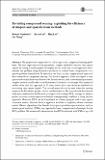Revisiting compressed sensing: exploiting the efficiency of simplex and sparsification methods
Author(s)
Vanderbei, Robert; Lin, Kevin; Liu, Han; Wang, Lie
Download12532_2016_Article_105.pdf (960.4Kb)
OPEN_ACCESS_POLICY
Open Access Policy
Creative Commons Attribution-Noncommercial-Share Alike
Terms of use
Metadata
Show full item recordAbstract
We propose two approaches to solve large-scale compressed sensing problems. The first approach uses the parametric simplex method to recover very sparse signals by taking a small number of simplex pivots, while the second approach reformulates the problem using Kronecker products to achieve faster computation via a sparser problem formulation. In particular, we focus on the computational aspects of these methods in compressed sensing. For the first approach, if the true signal is very sparse and we initialize our solution to be the zero vector, then a customized parametric simplex method usually takes a small number of iterations to converge. Our numerical studies show that this approach is 10 times faster than state-of-the-art methods for recovering very sparse signals. The second approach can be used when the sensing matrix is the Kronecker product of two smaller matrices. We show that the best-known sufficient condition for the Kronecker compressed sensing (KCS) strategy to obtain a perfect recovery is more restrictive than the corresponding condition if using the first approach. However, KCS can be formulated as a linear program with a very sparse constraint matrix, whereas the first approach involves a completely dense constraint matrix. Hence, algorithms that benefit from sparse problem representation, such as interior point methods (IPMs), are expected to have computational advantages for the KCS problem. We numerically demonstrate that KCS combined with IPMs is up to 10 times faster than vanilla IPMs and state-of-the-art methods such as ℓ[subscript 1]_ℓ[subscript s] and Mirror Prox regardless of the sparsity level or problem size.
Date issued
2016-05Department
Massachusetts Institute of Technology. Department of MathematicsJournal
Mathematical Programming Computation
Publisher
Springer Berlin Heidelberg
Citation
Vanderbei, Robert, Kevin Lin, Han Liu, and Lie Wang. “Revisiting Compressed Sensing: Exploiting the Efficiency of Simplex and Sparsification Methods.” Mathematical Programming Computation 8, no. 3 (May 9, 2016): 253–269.
Version: Author's final manuscript
ISSN
1867-2949
1867-2957